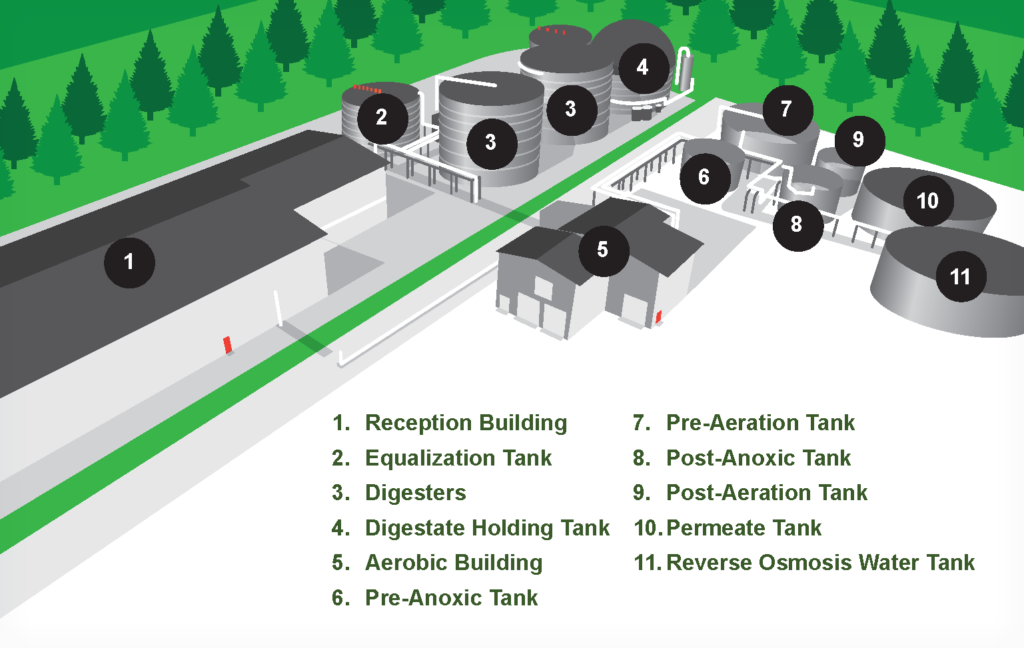The Record: Sustainable Resource Facility construction well underway at Nicholas Meat
September 29, 2022
September 29, 2022
This article by Christopher Miller was published in The Record on Sept. 29 and is shared here with permission.
LOGANTON – Nicholas Meat, LLC, a family-run, Sugar Valley company producing high quality beef as sustainably as possible has recently started their most ambitious initiative ever: the construction of the Sustainable Resource Facility (SRF) along East Valley Road.
The official facility groundbreaking took place on May 21, 2021, with 60 people in attendance, including PA Secretary of Agriculture Russell C. Redding and U.S. Congressman Fred Keller.
The SRF is a comprehensive environmental management system allowing the company to reuse water, reduce dependence on land application, manage odor, and generate energy from biogas.

As the first-ever Director of Sustainability at Nicholas Meat, LLC, Sugar Valley native Brian Miller’s main focus is purely environmental.
“I want to ensure that this project gets off the ground in a satisfactory manner and that it achieves the goals of the project,” Brian said. “When this facility is up and running I will manage the operation, which affords me the opportunity of being able to see all phases of this project from initial planning to final walk-throughs.”
The multi-million dollar facility will set a new standard for sustainability throughout the meat processing industry and will demonstrate the commitment to a sustainable Sugar Valley.
“We sought the advice of the best experts around the world,” Miller said. “We challenged these experts to look at all aspects of the business and find ways to reduce waste, recycle waste streams, and identify sustainable methods of handling our waste.”
In general, meat packing operations generate a lot of waste which typically includes odor and energy in it, and also nutrients that would otherwise be discarded and never used. “The goal of the project is to eliminate odor, capture the nutrients, and recover energy and turn that into energy for the packing plant,” said Dr. Tom Richard, director of Penn State University’s Institute of Energy and Environment, and professor of agriculture and biological engineering.

The water treatment process is very similar to municipal treatment which relies on nutrient removal. In fact, when it is fully operational, it will remove over 1,800 pounds of nitrogen from the environment each day. Organic matter will be broken down to produce biogas that will be used as green energy for the facility.
Water reclamation is the practice of reclaiming water from a variety of sources, treating it, and reusing it for beneficial purposes such as agriculture and irrigation, groundwater replenishment, industrial processes, and environmental restoration, according to the Environmental Protection Agency.
Water from the processing facility will be piped from the plant to the SRF to undergo the advanced treatment, disinfection, and reverse osmosis, in essence, allowing Nicholas Meat to reuse up to 90% of the water within the meat processing operations.
In the coming months, the SRF site will continue to transform. Crews have completed site work in preparation for the installation of several tanks this winter as weather permits.
With the building of the SRF, a new conservation area has been developed as compensation for the forested “riparian buffer” and watercourse impacts that will occur because of the land development needed for the SRF.
A riparian buffer, or riparian areas, are lands that occur along watercourses and water bodies, such as flood plains and streambanks. Soil and vegetation characteristics are strongly influenced by the presence of water.
After an extensive search, Nicholas Meat secured 12 acres of land about 12.5 miles northwest from the SRF in Greene Township, Clinton County for the Conservation Reserve. Completed in 2021, the land is now home to almost 2,500 trees such as Silver Maple, Swamp White Oak, American Sycamore, Red Oak, and Black Cherry, and a wide variety of native wetland grasses and wildlife.
Nicholas Meat will monitor the Conservation Reserve for five years. “We will ensure the trees and plants on the project become established, and after five years it does its own thing and we made it viable,” said Brian.
The ambitious project has barely broken ground in Sugar Valley, but Nicholas Meat has already started to blaze a trail for other meat processing plants to follow when it comes to sustainability, environmental protection, and appreciation.
“I am pleased to be a part of this ambitious project that will bring many environmental benefits to the company and community,” Brian said.